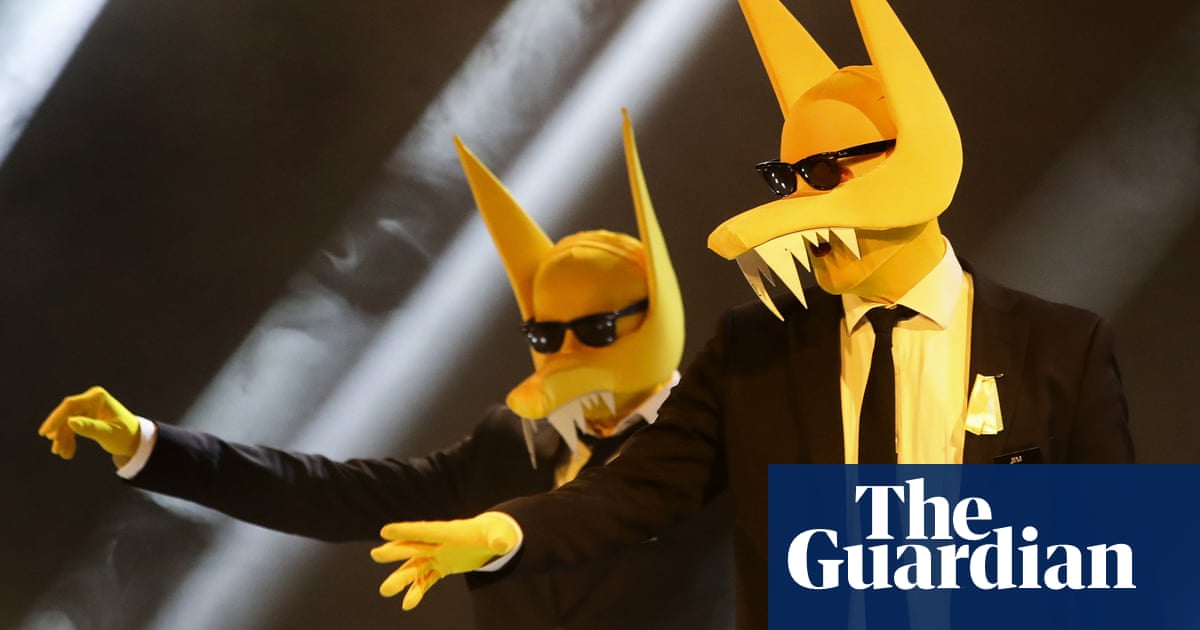Eurovision has always been a time to gather round the TV and experiencedancing babushkas,gorilla stage invasionsand someoneinhaling from a helium balloonhalfway through their song. But being a Eurovision entry now looks like being part of an exhausting social media content factory, which may be driving some of the wackiness out of it. No one isgiving a wolf a bananathis year.
In 2025, a Eurovision artist needs to tread on eggshells to avoid putting a foot wrong during months-long internet exposure, but must also stay interesting enough to attract likes and follows. It has also become the norm for contestants to provide alternative versions of their own or other Eurovision songs for the viral content mills. And it is difficult to do that if you are, like Ireland in 2008,sending a puppet.
So if you were thinking of sending, say, novelty buxom butter churners, as Poland did in 2014 to accompanyDonatan & Cleo singing We Are Slavic, you must bear in mind that they have to commit to the bit and be prepared to churn butter all over TikTok for months, plus provide additional YouTube video for the official channel.
This year’s standouts on that alternate content score include Lithuania’s Katarsis supplyinga more intense choir-laden versionof their alt-rock entry Tavo Akys, andGeorgia’s entry doing a cover of the Netherlands entry. We have also been treated toan acoustic Greek entrywith an additional lovely dog in the video, anda darker versionof Laura Thorn’s entry for Luxembourg,La Poupée Monte le Son, that arguably puts the original in the shade.
Still, this trend for extra content did at least give us theincredible deadpan Go_A coverof fellow Ukrainian Eurovision legendary entryVerka Serduchka’s Dancing Lasha Tumbai, so perhaps it isn’t all bad.
Voting atEurovisionisn’t as secret as a papal conclave, and social media success is clearly going to make a difference. The lengthy pre-contest campaign may influence people, and juries, to converge on popular acts, making the result a self-fulfilling prophecy.
The number of YouTube views a song racks up also affects its betting odds. At the moment, Sweden’s KAJ lead both withBara Badu Basta. The producers who shape the running order of the final are hardly going to relegate a favourite of fans and bookies alike to an unfavourable slot on the night.
Yet the modern environment seems to have driven a lot of countries to send something safe in terms of song and artist profile. Slovenia, France, Switzerland, Israel and the Netherlands have all gone for basic Eurovision ballads. And there is a proliferation of electronic europop seeking to become club anthems. Perhaps taking a cue from 2023’s winner,Tattoo by Loreen, this year Germany, Spain, Ireland, Denmark, Cyprus and Belgium have all turned in entries that are so similar the world’s worst DJ could seamlessly mix them.
Even Austria’s entry (currently second favourite), JJ’s emotional and operaticWasted Love, makes a point of finishing in a way that could be timed to work perfectly for a rave crowd watching the sunrise in Ibiza.
Will it still be an absolute riot of fun in Basel on Saturday? Of course. With the advent of streaming there are fewer and fewer genuine live event television moments, and apart from sport they are scarce, especially one that the whole of Europe watches at the same time. Last year the European Broadcasting Union (EBU) claimed that 163 million people watched the three live shows across its 37 broadcasters.
Sign up toWhat's On
Get the best TV reviews, news and features in your inbox every Monday
after newsletter promotion
And this isn’t to say there isn’t anything quirky in this year’s lineup. Pre-watershed queasiness about howthe original lyrics “Serving kant”might sound mean Malta’s Miriana Conte risks delivering a joke stripped of its punchline in her song, but the bendy-legged dancing ofEstonia’s Tommy Cash in Espresso Macchiatowill be sure to raise a smile. Australia has sent a sexual innuendo masquerading as a song, with an official video mostly shot at crotch level just in case you hadn’t got the reference.
In 2025 there aren’t any absolute clunkers, but equally, several artists who narrowly missed out on winning in past year – thinkSam Ryder’s Spaceman,Käärijä’s Cha Cha Cha, and Joost Klein’s oustedEuropapa– must be looking at this year thinking they would have romped to victory in Basel.
But there is always room for optimism. Assuming the contest doesn’t get ripped apart by rows about who participates –Ireland’s RTÉ has asked the EBU for talksafter 72 former contestants called for the Israeli public service broadcaster to be banned from taking part – countries who don’t succeed often react to failure by sending something totally different the following year.
Maybe someone out there will be watching Saturday’s final in Basel and think, come on, let’s go to the 70th Eurovision song contest, and let’s show Europe something way more weird. We demand morePapa Pingouin!
